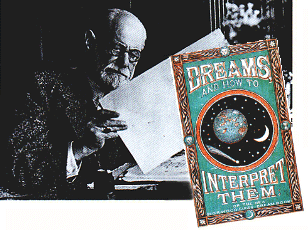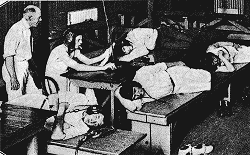What do dreams mean?
 |
The psychoanalyst Sigmund Freud, who believed dreams
reveal the unconscious, and that dream analysis can unlock this repository
of repressed feelings. |
Tread softly
because you tread on my dreams
Throughout history, people have believed that dreams foretell the future
and contain potent symbols. Most dreams, when the dreamer is wakened and
questioned, are about quite dull and everyday events. Occasionally there
are the bizarre and erotic elements that have provoked philosophers, religions
and modem psychoanalysis to view dreams as containing a range of clues or
answers to questions about ourselves. |
Not everyone remembers their dreams, but those who do have no difficulty
understanding why people have always been fascinated by dreams and dreaming.
Our dreams may shock, disgust or delight us, or they may be so vivid that
the emotions they provoke can affect our mood for the entire day. So although
some scientists may have no time for the layman's fascination with dream
interpretation, we cannot dismiss our dreams entirely.
There can be few cultures that have not attached significance to the meaning
of dreams. In the Bible, stories of dreams
and their interpretation abound. One of the most famous examples, in the
book of Genesis, is the Pharaoh's dream of the seven lean kine (cattle) devouring
the seven fat kine, which Joseph interpreted as seven years of plenty followed
by seven years of famine. Aristotle, the Greek philosopher who died in 322
BC, had a theory about why we dream. He rejected the idea then in vogue that
dreams were sent by the gods, and suggested instead that dreams resulted
from images which people had seen or thought about earlier being retained
in the mind. Some cultures make little distinction between dream events and
reality. For example, a Paraguayan Indian dreamt that a missionary shot him,
and then tried to kill the missionary. In other cultures, people are, or
were, expected to carry out their dreams. Among some natives of Kamchatka,
in Russia,a man bad only to dream of sexual intercourse with a woman for
her to be obliged to allow him this favour. There is an example from the
18th century of an Iroquois Indian who dreamt that ten friends dived into
a hole in the ice on a lake, and emerged through another. Told of the dream,
the friends obliged - but only nine came up through the second hole.
 |
 |
The answers may lie in dreams Some have believed
that we can learn while we're asleep (above, sleeping
US airmen being fed information in tests). Others believe we can learn from
dreams. The German chemist Friedrich Kekulé
worked for years to discover the molecular
structure of benzene. One night, dozing in front of a fire, he saw an
image of many snake-like structures. Then
one of the snakes took its tall In its mouth - and Kekulé realised
in a flash that the structure of benzene was a ring of carbon atoms
(left). |
In some countries, dreams play an important role in marking life events.
For example, in Jamaica it is said some women do not believe they are pregnant
until they have dreamt of a ripe fruit bursting to show its seeds.
The grandfather of all dream interpretation in recent times must be the
psychoanalyst Sigmund Freud, who died in 1939.
He believed dreams were the expression of unacceptable and therefore repressed
sexual desires. He decided, for example, that dreams that involved walking
up stairs, playing piano or any rhythmic activity were really about sexual
intercourse.
Carl Jung, another psychoanalyst, disagreed. He hypothesised that
dreams gave people information from a sort of store of ancestral experience
-the collective unconscious.
More recently, speculations about why we dream have gained from scientific
investigation into sleep. We now know that most dreaming takes place during
REM sleep. Human adults spend about 1.5 hours a night in REM sleep and thus
approximately the same amount of time dreaming. This may come as a surprise
to those who believe that they rarely, if ever,dream. People are much more
likely to recall their dreams if they wake up during or shortly after REM
sleep. So those who tend not to remember their dreams, and would like to
do so, might have more success if they set their alarm clocks for an hour
or two earlier than usual.
Our memory for dreams quickly fades, unlike our memory for the events of
real life. Dream enthusiasts recommend writing them down immediately on awakening
if you want to remember them. Apart from the written record, this activity
also transfers the content of the dream to your conscious mind, making recall
easier.
It is a popular myth that dreams take place in seconds even though they may
feel as though they have taken many minutes. The origin of this idea may
lie with the French doctor Alfred Maury, who lived in the last century. He
had a lengthy dream that he was brought before a revolutionary court, questioned,
sentenced to death, led to the scaffold and beheaded. When he woke in a panic,
he found that part of his bed had fallen on his neck - and decided that the
whole dream must have happened very quickly, stimulated by the physical pressure
on his neck. But recent studies, in which people were woken after they started
dreaming and asked how long they had been dreaming, have shown that our own
assessments of the length of our dreams are fairly accurate.
Colin Shapiro, professor of psychiatry at the University of Toronto, adds
that new-born babies have about eight hours of REM sleep a day. "This strikes
me as one of the most impressive facts that we have about dreaming. Perhaps
dreaming is something to do with brain growth and forming new connections
between brain cells. If so, then dreaming is a pretty useful thing for babies
to be doing."
Dreaming may indeed be something to do with consolidating new information:
one recent study found the amount of dreaming done by people made to carry
out new and difficult tasks increased greatly. Others have suggested exactly
the opposite: that dreams make it possible for us to "wipe the slate clean"
and eliminate unwanted information from the brain.
There is some evidence that our dreams can help us stay in touch with our
health. Professor Shapiro says in the British Medical Journal that dreams
may reflect the presence of disease, and may even cause or precipitate disease.
One study found that people with severe heart disease (the extent of which
had not been clarified at that stage) had significantly more dreams dealing
with separation and death. In another study,
elderly
people who dreamt of "lost resources" were more likely to show loss of
brain tissue on a brain scan, though they had no overt signs of brain
deterioration.
Why do some people remember their dreams more often and more clearly than
others? People's personalities may also influence recall of dreams. Professor
Shapiro says: "Some people who are very in touch with their emotions recall
their dreams very well. Others, with "alexithymic" personalities (people
for whom the emotional side of their lives is not very significant) do not
recall their dreams." Professor Shapiro is currently researching whether
the dream recall of "alexithymic" people is improved if they are woken up
during REM sleep.
Professor Allan Hobson, of Harvard Medical School, says it's easy to answer
the question of why people dream. "It's because the brain is activated during
sleep," he says. "The real question we should be asking is:'Why is the brain
activated during sleep?"'
Sharon Kingman
Nightmares: something to be frightened
about?
The word nightmare has less to do with wild horses than many
artistic interpretations would have us believe. The term is in fact derived
from "night" plus the Old English meaning evil spirit.
-
Nightmares most commonly affect children, but about half
of all adults have occasional nightmares and about one in a hundred adults
suffers from nightmares once a week. Nightmares are really just bad dreams.
Like ordinary dreams, they occur during REM sleep, late in the period of
sleep, during which the body muscles are paralysed. On waking up, the sufferer
is immediately aware of his or her surroundings and can often recall the
nightmare in detail.
-
Night terrors are rather different. They affect fewer
than one in thirty children, most commonly those aged two to six, and fewer
than one in a hundred adults. They usually occur within the first two hours
of going to sleep. Sufferers normally scream and appear to be terror-stricken.
They may thrash about in bed or sit bolt upright, and they do not respond
to touch or speech during the night terror.
After a night terror, sufferers will normally have little recall of the event,
except possibly for a feeling of falling or choking, for example. Parental
concern for a child who suffers from night terrors may cause the child more
anxiety than the night terrors themselves. Doctors recommend seeking medical
advice if they persist for longer than about three months.
-
Sleepwalking is closely related to night terrors in that
it occurs during the deepest stage of non-REM sleep when the muscles are
not paralysed. A sleepwalker gets up and walks about, eyes open, and may
utter meaningless phrases. Sleepwalkers are hard to waken - the best strategy
is to guide them gently back to bed without waking them up. People who go
straight from stage four sleep to wakefulness have a propensity to sleepwalk.
Sleepwalking should not be dismissed lightly. Sleepwalkers have been known
to injure themselves severely. Anyone who sleepwalks, or whose children
sleepwalk, should take measures to reduce the risk of accidents by, for example,
fitting bars on upstairs windows, stair gates and locks on doors.
-
Crimes have been committed by some people who sleepwalk or
suffer from night terrors. In one famous case in 1985, a 33-year-old salesman
was acquitted of murdering his wife, whom he claimed he had strangled during
his sleep. He said he had been having a dream that he was being attacked
by two Japanese soldiers.
The jury chose to believe psychiatrists who gave evidence on the defendant's
behalf that he had been suffering from a vivid night terror at the time,
and acquitted him.
|
INDEX
 Nov93 p60
Nov93 p60


